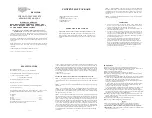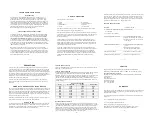
TESTING FOR GOLD PLATE
INTRODUCTION
Probably most of the Gold plated items referred to as “costume jewelry” or
“fashion jewelry” contain Gold at the surface, which is no thicker than eight
millionths of an inch. Such a Gold plate is referred to as Gold flash. A large
percentage of Gold flash is sufficiently thin and/or porous (microscopically) that
the M24 Gold Tester will “read through” the plate and indicate “NOT GOLD”. A
thicker plate will read as Karat Gold unless a portion of the surface being tested is
erased with the eraser pencil or filed to expose the metal underneath. The eraser
should be used as first choice since it is easier to use and non-destructive.
However, the eraser will not work on thick Gold plate.
GENERAL DESCRIPTION OF PROCEDURE
To determine that an item is Gold plated “non-Gold”, the user of the M24 Gold
Tester must take at least two different readings, one reading of a surface, which
has not been erased or filed. The reading of the erased or filed surface
will be
lower if the metal underneath is not gold.
(To be sure the metal underneath is
not Palladium, see the section on “TESTING FOR PALLADIUM”.) The M24
Gold Tester will read as “NOT GOLD” if a sufficient area of non-Gold is exposed
to the liquid but the un-erased or un-filed Gold plate exposed to the liquid does
have some effect on the reading, this is why point 2 of the following section under
“PRECAUTIONS” is important.
When testing for heavy Gold plate, it may be necessary to use a fast drying
lacquer or material such as a clear fingernail polish. The area to be tested must be
coated with the lacquer and allowed to dry. Next, make a file mark in the center
of the coating deep enough to expose the base metal. Then test the exposed base
metal with the M24 Gold Tester. Do not allow the Testing Solution to touch any
part of the Gold that has not been coated.
7
GOLD COMPOSITION
There are four basic colors of Gold:
1) Yellow..................................................................most common
2) White....................................................................second most common
3) Red(Pink/Rose)...........................................……..uncommon
4) Green....................................................................very uncommon
The colors are obtained by the use of two or more varied quantities of base metals.
These base metals are Silver, Copper, Zinc, and Nickel.
Not only are there four basic colors but each color can and does vary the percentages
of the base metals. As such, there is no specific formula for each color of Gold. This
makes for a range of readings in each color plus a variation of each color at any
specific Karat mixture.
The M24 Gold Tester can distinguish between Karats of the two popular colors,
Yellow and White, by means of color selector buttons. Most red color Gold can be
determined by using the White range selector button. Most green color Gold can be
determined by using the Yellow range selector button. There are no ranges that are
compatible for use on dental Gold alloys.
CAUTION: The M24 Gold Tester is a highly accurate, precision instrument for
determining Gold Karat values. However, should any disagreement arise with its use,
it is recommended that confirmation be obtained with a Fire Assay examination
process. This device, although highly accurate, should be used as a guide to Gold
Karat values. The exactness of the device depends on adherence to the instructions
provided in this manual and the knowledge of the base metal alloys which are
involved.
9
When the “Low Battery” indicator flashes, it is necessary to replace the battery before
operating the unit. Simply remove the 4 small screws located under the rubber feet
on the rear of the Gold Tester. Carefully remove the rear cover. Locate the 9 Volt
Battery and replace with a new one. Replace the rear cover, being very careful not to
pinch the wire leads with the cover. Replace 4 rubber feet.
TROUBLE SHOOTING GUIDE
PROBLEM CAUSE/SOLUTION
_____________________________________________________________________
•
“Yellow Gold” or “White Gold” light
•
Replace Battery
does not light.
•
Low battery light is flashing.
_____________________________________________________________________
•
The testing light does not flash
•
Clean test Gold in area to be tested.
•
Alligator clip not connected to test Gold.
•
Reference Gold coated. See note at end
of document.
_____________________________________________________________________
•
24 Karat indication for all tests.
•
Test Gold removed before testing light
goes out.
•
Test Gold or clip being shorted to
Reference Gold at bottom of Well.
____________________________________________________________________
•
Misread on high Karats
•
Temperature not within 65
°
F to 90
°
F.
____________________________________________________________________
•
NOT GOLD reading for all tests.
•
Alligator clip in liquid during test.
11
PRECAUTIONS
1) When testing the un-erased or un-filed portion, be sure that the test area has been
relatively unaffected by wear. Flat or thin Gold plated items will tend to be worn at the
edges. If it is difficult not to expose a worn area when testing an un-erased or un-filed
area, the user may wish to selectively mask any area in question with fast drying lacquer.
The reason for masking a worn surface is that if you test a worn surface first, you may
obtain the lower Karat reading before any erasing or filing has been accomplished. You,
therefore, may not get a lower Karat value on your second test and not be able to
determine that you are testing Gold plate.
2) When testing the erased or filed portion, be sure that enough of the surface area
immersed in the liquid is erased or filed down to expose the suspected “base metal”
underneath.
MORE DATA ON TESTING FOR GOLD PLATE
The vast majority of Gold plate is 22K or better. Most Gold plated jewelry is flash Gold
plate and most flash Gold plate is less than 5 millions of an inch (1/8 micron). The M24
Gold Tester will read right through the 22K Gold plate and indicate anywhere from not
Gold to 12 K Gold. Any time you get a 12K or lower reading, Gold plating should be
suspected. To determine Gold plate simply use the gray flat eraser on the test sight and
then inspect for the presence of base metal.
In addition, inspect the Gold color of items reading 9-12 K Gold. If they are really 9-12
K they would not have that “rich” color of a 22K Gold plated item.
FINAL POINT
It is strongly recommended that users of the M24 Gold Tester practice testing for Gold
plate on a few items believed or known to be Gold plated. A few sets of practice runs
described under “General Description of Procedure” will impart confidence to the point
that the user will find testing for Gold plate to be fast and easy.
8
TESTING FOR PLATINUM
Platinum is indicated when the test-item reads 22K or higher. That is because white Gold
above 18K is virtually non-existent.
TESTING FOR PALLADIUM
Both Palladium and Platinum will indicate Karat Gold if tested. Platinum jewelry is usually
traded at a higher price than Gold jewelry, so Platinum is seldom marked as Gold.
Palladium, however, is one-quarter to one-third the price of pure Gold, so it should be noted
that pure Palladium may read as medium Karat Gold. Palladium prong settings are
sometimes soldered into diamond solitaire White Gold rings. If Palladium is suspected, it is
easily distinguished from Gold as nitric acid will quickly turn Palladium dark, Gold is not
affected in this way.
TABLE OF STANDARDS
Karat
Decimal Gold
Gold %
Part Per 1000
24 K
1.000
100.0
1000
22 K
0.917
91.7
917
20 K
0.833
83.3
833
18 K
0.750
75.0
750
16 K
0.667
66.7
667
14 K
0.583
58.3
583
12 K
0.500
50.0
500
10 K
0.417
41.7
417
9 K
0.375
37.5
375
MAINTENANCE OF THE M24
The most important step to consistently have accurate results using your gold tester, is the
cleaning of the,
”Well & Clip”
. Also included with your unit is a standard
“Q-Tip”,
which is
to be used for the cleaning of the well. Do your test as normal, when the test is complete or
changing chemical solution use one end of the Q-Tip to absorb the chemical, then use the
other end to remove any remaining residue. Dispose of the Q-Tip when complete. Never
leave any chemical solution in the well when not testing. If any chemical happens to come in
contact with the clip, clean immediately with a clean paper towel.
10
SERVICE
Before returning unit for service or repairs, you MUST obtain a RETURN
MATERIAL AUTHORIZATION (RMA). An RMA may be obtained by writing:
TESTING SOLUTION [No. 1995]
Replacement of the Testing Solution and Cleaning Solution can be obtained from
your supplier or:
Dymond, Inc.
3307 Industrial 25th Street
Fort Pierce, FL 34946
Phone (772) 429-0045
Fax (772) 429-0170
WARRANTY
Dymond, Inc. provides that each M24 Gold Tester System will be free from defects in
material and workmanship for a period of 2 years from the date of purchase. This
Warranty becomes void by:
1) Unauthorized repair, misuse, modification, alteration, tampering or breaking any
factory seal.
2) Accidental damage, neglect or improper use.
3) Leaving Testing Solution in Test Well.
(Battery and solutions are not included in warranty.)
Dymond, Inc. shall not be held legally liable or responsible for any error in
determining the Gold content of any object using the M24 Gold Tester.
12


